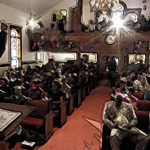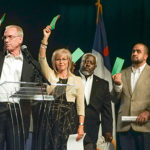As I’ve come to know Native Americans across my state, I’ve realized they suffer from racism that is as extreme as any I know. How can this be addressed?
Racism against Native Americans may well be the most invisible and systemic injustice in this country. The devastating social and economic effects from herding Native Americans onto reservations linger, unseen by the rest of the country. Shortly before the current economic recession, the real per capita income of Native Americans living on reservations was less than half the national average. Unemployment was double the rest of the country. More than 24 percent of Native Americans lived in poverty, compared to 12.4 percent for all races. Twenty-nine percent lived without health care coverage, compared to 15.5 percent for all races. The current economic downturn is certain to have made matters worse.
Few people are aware Native Americans are victims of violence at more than twice the rate of the average American citizen. Native American women bear the brunt of the highest level of sexual and domestic abuse of any group in the country. One study discovered three-quarters of Native American women have experienced some type of sexual assault. According to the U.S. Department of Justice, more than 70 percent of all violence against Native Americans is perpetrated by people of another race.
Fewer people are aware of the woeful inadequacy of the criminal justice system for Native Americans. State and local authorities have no jurisdiction to investigate and prosecute crimes committed on tribal lands. Prolonged confusion between federal and tribal authorities has made matters worse. The confusion relates to which agency has legal jurisdiction to investigate and prosecute crimes committed on tribal lands. Native Americans often are left with little or no law enforcement protection.
The first thing Christians can do to address this is to take a long look at this list of injustices. We can expect those who have the love of God in them to have compassion on brothers and sisters they clearly see are in need. Meeting those needs will require more than offering a little temporary assistance with some immediate physical needs. It also will require long-term social solidarity and an active spiritual fellowship that will stand beside them to help correct the economic, legal and political inequities that have a hand in perpetuating these injustices.
Ultimately, the most important thing to do is to become a genuine friend of Native Americans. Learn firsthand what life is like for them. Look at yourself through their eyes and ask yourself, “How much of Jesus have they seen?” Look at your church through their eyes and ask yourself, “How much of Christ have they seen?” Answering those questions will give us an idea where we might begin addressing racism against Native Americans.
Bruce Prescott, executive director
Mainstream Oklahoma Baptists
Norman, Okla.
Sign up for our weekly edition and get all our headlines in your inbox on Thursdays
Right or Wrong? is sponsored by the T.B. Maston Chair of Christian Ethics at Hardin-Simmons University’s Logsdon School of Theology. Send your questions about how to apply your faith to [email protected].














We seek to connect God’s story and God’s people around the world. To learn more about God’s story, click here.
Send comments and feedback to Eric Black, our editor. For comments to be published, please specify “letter to the editor.” Maximum length for publication is 300 words.